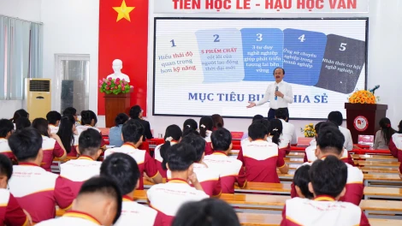This young man is typical of a segment of today's youth: they possess expertise but lack other skills. This may also explain why some high-achieving students, graduating with honors, still struggle to find employment. Leaving aside the question of whether the training and grades are genuine, there's a clear difference between school and real life. Some experts say this difference is evident in something students rarely learn: soft skills.
A survey conducted by the Love Frankie regional social change research organization and Indochina Research Ltd. revealed that many young Vietnamese people lack essential skills such as communication, creativity, and teamwork.
According to the survey, formal education seems to lack the complete and necessary skill set for young people to be employable. When asked about the three most important skills for the workplace, survey participants chose communication skills (78%), along with other soft skills such as creativity (48%), teamwork (35%), time management (21%), analytical thinking (21%), and interpersonal skills, i.e., the ability to work well with others (21%). “Communication skills are important, but no school teaches them,” a teenager aged 16-19 in Hanoi told the surveyor.
A lack of soft skills is a problem frequently raised by employers at job fairs. They argue that while Vietnamese youth possess knowledge and expertise, these only account for 25% of success, with soft skills determining the remaining 75%.
According to a scholar from the Vietnam Academy of Social Sciences , traditional education in Vietnam focuses on equipping individuals with classicized knowledge and moral and behavioral education so that they can develop their personalities and contribute to society. However, this doctor argues that modern education should not only systematically enrich knowledge but also create a need and capacity for lifelong learning, along with equipping individuals with life skills and moral development.
According to him, Vietnamese students are considered excellent in the sense that they focus too much on a particular subject or topic. The advantage of this is that if a student is talented, that talent will be amplified, even to its fullest potential. However, the disadvantage is that it turns students into individuals who only care about excelling academically, and don't mind being weak in other areas.
The above opinions suggest that a lack of soft skills is a consequence of an education system that is heavily focused on theory. Programs concentrate on specialized knowledge, paying little attention to soft skills such as communication, teamwork, and critical thinking.
Meanwhile, the learning environment has not created opportunities to develop soft skills, specifically with few extracurricular activities, clubs, and volunteer programs. The pressure to achieve high grades and results leads students to spend more time on theoretical studies and less time developing soft skills.
Learning literacy, acquiring knowledge, or developing soft skills—ultimately, it all boils down to learning how to be a better person. Knowledge, experience, and soft skills combined help people build self-confidence, dare to accept challenges and overcome life's difficulties, be adaptable in all situations, easily integrate into new environments, and achieve success in life.
Therefore, promoting training and equipping young people with soft skills is something that the education sector and related agencies need to focus on.
Source




![[Photo] Head of the Central Propaganda and Mass Mobilization Department visits and congratulates the Ministry of Health and the Military Traditional Medicine Institute.](https://vphoto.vietnam.vn/thumb/1200x675/vietnam/resource/IMAGE/2026/02/24/1771938483290_img-2682-3562-jpg.webp)


































![[Photo] White pear blossoms bloom across the border of Pho Bang](https://vphoto.vietnam.vn/thumb/1200x675/vietnam/resource/IMAGE/2026/02/24/1771927665653_a8-8280-jpg.webp)
![[Image] A dreamy "livable city" under pink clouds](https://vphoto.vietnam.vn/thumb/1200x675/vietnam/resource/IMAGE/2026/02/24/1771930060937_tp4-jpg.webp)






































































Comment (0)